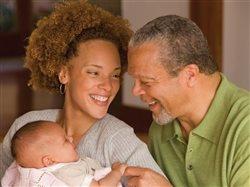
New grandbaby? Learn how to help baby and mom thrive
(BPT) – Grandparents play a unique, important role in caring for family members of all ages. Here are some ways that you can help keep babies and moms safe and healthy.
Helping babies sleep safely
Grandparents can help reduce the risk of Sudden Infant Death Syndrome (SIDS) and other sleep-related causes of infant death. To help your grandbaby sleep safely, make sure you:
* Always place your grandbaby on his or her back to sleep, for naps and at night.
* Use a firm sleep surface, such as a mattress in a safety-approved crib, covered by a fitted sheet.
* Keep loose bedding, blankets, quilts, crib bumpers, soft objects and toys out of your grandbaby’s sleep area.
* Do not smoke or allow anyone to smoke around your grandbaby.
‘Researchers have learned a lot in the past 20 years about how to keep infants safe while they sleep,’ said Dr. Catherine Y. Spong, Acting Director of the Eunice Kennedy Shriver National Institute of Child Health and Human Development (NICHD), which leads the Safe to Sleep(R) campaign to educate caregivers about ways to reduce the risk of SIDS and other sleep-related causes of infant death.
‘Grandparents often help parents take care of infants, including during sleep times, but they may not know that the recommendations for safe infant sleep have changed since they had young children,’ said Dr. Spong. ‘It is important for grandparents and all caregivers to know how to create a safe sleep environment for baby.’
For more information about safe infant sleep, visit http://safetosleep.nichd.nih.gov.
Supporting moms and moms-to-be
In all the excitement over a new baby, sometimes a mother’s health, including her mental health, can be overlooked. Research shows that as many as 1 in 10 women experience postpartum depression. However, mood changes and other symptoms of depression can take place anytime during pregnancy, not just after the baby is born. Because of their unique role in the family, grandparents may be among the first to notice that something is wrong.
Moms’ Mental Health Matters, another NICHD initiative, describes the signs of depression and anxiety related to pregnancy and birth and offers ways to cope and seek help.
‘New mothers may be hesitant to admit they’re feeling depressed or anxious, but supportive family members can make all the difference in helping to identify symptoms and encouraging moms to reach out for help when they need it,’ said Dr. Spong.
For example, during pregnancy and after birth, a mother may:
* Seem to get extremely anxious, sad or angry without warning.
* Seem foggy and have trouble completing tasks.
* Show little interest in things she used to enjoy.
* Seem ‘robotic,’ like she is just going through the motions.
* Have trouble sleeping.
* Check things and performs tasks repeatedly.
* Have difficulty caring for herself or the baby.
If you notice any of these signs in a new mom, encourage her to talk with a health care provider – or offer to make an appointment for her. If you need to find a health care provider in her area, call the Substance Abuse and Mental Health Services Administration Treatment Locator at 1-800-662-HELP (4357). For support and resources in her area, contact Postpartum Support International at 1-800-944-4PPD (4773).
To learn more about maternal mental health and find resources, visit https://www.nichd.nih.gov/MaternalMentalHealth.


